Claude Forthomme's Blog, page 51
December 24, 2012
2013 Will Be The Year of Baby Boomer Novels, Merry Boomer Christmas!
That's my prediction: boomer literature will be the Big Discovery of 2013, as the publishing industry, and not just Hollywood, realize there is a market out there of 78 million boomers in the US alone and many more in the rest of the world. What the boomers did for YA (Young Adult) literature 40 years ago, they will now do for BB lit. History repeats itself!
Merry Boomer Christmas!
For news about boomer lit around the Net, including articles and posts on the Passive Voice, Boomer Café, Digital Book Today, the Kindle Nation Daily, Venture Galleries and more, check here
For great Christmas gifts for the boomer in your life, check the bookshelf of the Goodreads Group discussing BB novels here, there are some 40 BB titles, see here.
Or go to the thread in the Amazon Kindle fora, here.
For the next great boomer film, QUARTET, featuring Maggie Smith, Billy Connolly, Michael Gambon and directed by Dustin Hoffman, check here. In the movie trailer you'll see the setting, it's just amazing! Look here:
It's coming up in January 2013, don't miss it!
Yes, boomer films and boomer lit have arrived! And it's not just about BB novels: there are BB short stories, BB poetry and, why not, BB non-fiction...
2013 will also be the year of Readers! Just look at this picture I took yesterday in Rome in my neighborhood bookstore:
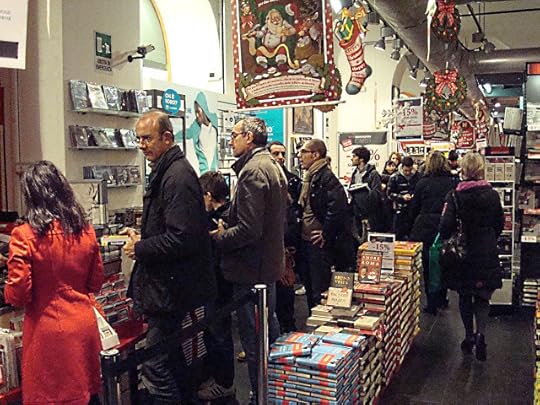
These are people queuing up to pay! Such a long line, much longer than any you see in other stores in the area - we're in a deep recession in Italy, people aren't buying anything but they're buying books! Whoever said that Italians don't read...And whoever said that women read more than men? Just look at the number of men in that line...
Have a Successful and Happy 2013!


Merry Boomer Christmas!
For news about boomer lit around the Net, including articles and posts on the Passive Voice, Boomer Café, Digital Book Today, the Kindle Nation Daily, Venture Galleries and more, check here
For great Christmas gifts for the boomer in your life, check the bookshelf of the Goodreads Group discussing BB novels here, there are some 40 BB titles, see here.
Or go to the thread in the Amazon Kindle fora, here.
For the next great boomer film, QUARTET, featuring Maggie Smith, Billy Connolly, Michael Gambon and directed by Dustin Hoffman, check here. In the movie trailer you'll see the setting, it's just amazing! Look here:
It's coming up in January 2013, don't miss it!
Yes, boomer films and boomer lit have arrived! And it's not just about BB novels: there are BB short stories, BB poetry and, why not, BB non-fiction...
2013 will also be the year of Readers! Just look at this picture I took yesterday in Rome in my neighborhood bookstore:

These are people queuing up to pay! Such a long line, much longer than any you see in other stores in the area - we're in a deep recession in Italy, people aren't buying anything but they're buying books! Whoever said that Italians don't read...And whoever said that women read more than men? Just look at the number of men in that line...
Have a Successful and Happy 2013!


Published on December 24, 2012 00:21
December 19, 2012
When Music Meets Poetry...
The international poetry anthology edited by Oscar Sparrow, FREEZE FRAME (published by Gallo Romano, UK) is to be accompanied by music and I wondered what music could ever fit the different voices of 6 totally different poets. Well, now I've stopped wondering and I'm amazed!
Listen to it, tell me what you think:
https://soundcloud.com/galloromano/01-freezing-the-frame
I find it hauntingly beautiful...Even if you're in a bad mood for some other reason, listen to it, it will change your mood for the better!
This music has the power of poetry - that ability to operate on one's mood which is poetry's greatest appeal, regardless of the theme. Just let the music and the poems work on you and for you...
FREEZE FRAME, a poetry anthology, together with audio book, will be coming out on December 21. There will be a Google+ hangout on 21 December, 6 pm GMT. Click here to join and meet the 6 poets, Paul Tobin, Jefferson Hansen, Jo VonBargen, Candy Bright, Oscar Sparrow and... me!
Freeze Frame - Stop Time - Carpe Diem - Catch the vanishing moment...Let the Mouth of Truth talk to you...
And with my personal warm thanks to the anthology's
editor, Oscar Sparrow, tireless and indomitable, and to author and poet
Emma Calin (regretfully she didn't participate in this anthology but she
is giving us selflessly her time and support).
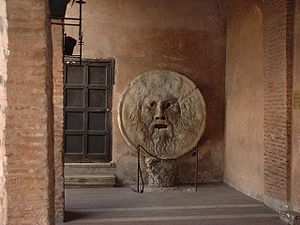
Roma-bocca della verità (Photo credit: Wikipedia)


Listen to it, tell me what you think:
https://soundcloud.com/galloromano/01-freezing-the-frame
I find it hauntingly beautiful...Even if you're in a bad mood for some other reason, listen to it, it will change your mood for the better!
This music has the power of poetry - that ability to operate on one's mood which is poetry's greatest appeal, regardless of the theme. Just let the music and the poems work on you and for you...
FREEZE FRAME, a poetry anthology, together with audio book, will be coming out on December 21. There will be a Google+ hangout on 21 December, 6 pm GMT. Click here to join and meet the 6 poets, Paul Tobin, Jefferson Hansen, Jo VonBargen, Candy Bright, Oscar Sparrow and... me!
Freeze Frame - Stop Time - Carpe Diem - Catch the vanishing moment...Let the Mouth of Truth talk to you...
And with my personal warm thanks to the anthology's
editor, Oscar Sparrow, tireless and indomitable, and to author and poet
Emma Calin (regretfully she didn't participate in this anthology but she
is giving us selflessly her time and support).

Roma-bocca della verità (Photo credit: Wikipedia)

Published on December 19, 2012 02:21
December 13, 2012
The Scandal of the Charity Business: Donors Beware!

Charity show (Photo credit: Wikipedia)
The charity business is the unsavory side of humanitarian assistance. A recent Arte TV investigation (aired on 11 December 2012, click here) revealed the extent of the scandal in Germany, France and the United States. The film lasts 100 minutes and is in French and German only, but here are the highlights, you don't want to miss them:
- fund-raising activities tend to gobble up most of the donations, in some cases up to 100% and not a penny arrives at destination! In Germany, only some 230 charity funds out of a total of 580,000 have been classified as bona fidae institutions by the German Central Institute of Social Questions. They base their judgment on whether those charity funds make their budget public or not (most of them don't) and whether less than 30% of their budget is spent on fund-raising.
In France, there is no similar oversight institution, control is in the hands of the Cour des Comptes (Controller Court) that doesn't see it as its mandate, and more generally French Justice. As of now, 17 French charity institutions are under investigation. And this has been going on for 3 years now, with still no verdict in sight. Meanwhile these organizations continue to raise money and, interestingly, they refused to talk about their business. In the film, we see how, along with the cameramen of Arte TV, a French journalist (Etienne Gingembre of the Revue Economique, Le Capital), repeatedly tries to reach them and is every time rudely turned away.
In America, the situation is better: charity funds must make their budget public and there is an organization, the Better Business Bureau's Wise Giving Alliance (see article below) that provides guidance to donors and helps them avoid scams.
This said, the fact remains that there is no government oversight or law about what percentage should go to beneficiarie s . That 30% limit which sounds so reasonable is simply not respected. Hundreds of thousands of charitable organizations manage to fall through the cracks and avoid investigation while donors keep giving and lining up the fund-raisers' pockets!
- the number of charitable foundations has exploded and they compete with each other to raise funds, mostly via mailing: as a result, they invest increasing resources in communications, PR and mailing out requests for donations. Arte TV dug out the extraordinary story of the St Joseph charity (run by a Catholic priest) in Dakota, US aimed at taking care and educating some 200 local American Indians. Bottom line, because of the costs of fund-raising, they run a huge budget, some $40 million/year! In other words, to give an education to 200 children, $200,000 are spent every year on each child!
- the massive mailing campaigns yield an amazingly low rate of return: somewhere between 0,5% and a maximum of 2% of the requests are answered, and average donations are puny (between $15 and $20). This means that requests and pamphlets that are both costly to print and to mail have to be sent in the millions to give any results, and the campaigns have to be repeated several years (up to 3 or 4 years) to give results in terms of donations!
- a whole mailing industry has arisen in the charity business, in parallel to the charity funds, effectively pocketing the donations or at least leaving very little for charity. They make some charitable organizations look like mail boxes!
- the strategies to request donations verge on the immoral as a result of the acute competition between charity organizations. While Christmas cards included in the mailed request are considered "normal", even acceptable, the inclusion of physical gifts like a writing set, a small wooden carved bison (a St Joseph's gift), a false "silk" scarf etc are close to unacceptable as they induce in the donor guilt feelings for having received such a gift, thus inspiring him to give more than he intended.
When one brave German journalist tried to draw attention to the fund-raising hubris with both a website (Stefan Loipfinger who ran CharityWatch.org on the web) and a book ( Die Spendenmafia: Schmutzige Geschäfte mit unserem Mitleid, published in 2011), he found himself under violent attack, accused of calumniation and brought to court. In the Arte TV film he reports that his family's safety has been directly threatened and by February 2012 he had to close down his website!
- the humanitarian aid community lives in a state of denial: instead of cleaning up the charity industry and setting rules of behavior and calling for oversight systems, the problems are swept under the rug. As a result, the bad sheep threaten to overrun the good ones and could bring down the whole system.
Moreover, recession and austerity are bound to hurt the fundraising business. In America, there is talk among both the Democrats and Republicans to tighten up on current tax exemptions on donations, thus putting an end to fundraising hubris. In Europe, government support (where it exists, e.g. in the UK) could come to an end. Furthermore, there's evidence that the ultra-rich gives less today than in 2007, before the start of the recession.

Better Business Bureau logo. (Photo credit: Wikipedia)
Under the circumstances, it would seem urgent for the humanitarian community to wake up and address those issues!
Meanwhile, if you're thinking of giving this Christmas, beware! Take a little time to double check on exactly what your favorite charity is up to!
Related articles
 Know Where your Donations are Going
Know Where your Donations are Going AG to donors: Get most bang for your buck
AG to donors: Get most bang for your buck Charitable donations from super rich are 'getting smaller'
Charitable donations from super rich are 'getting smaller' Marketing & Fundraising - What Are the Challenges for Small Charities?
Marketing & Fundraising - What Are the Challenges for Small Charities? CLAUDIA BUCK: Be wise when giving to charities
CLAUDIA BUCK: Be wise when giving to charities 'Do's and don'ts' of charity donations
'Do's and don'ts' of charity donations Charities cannot rely on handouts, says aid minister Lynne Featherstone
Charities cannot rely on handouts, says aid minister Lynne Featherstone

Published on December 13, 2012 13:18
December 10, 2012
The Challenge of Designing a Unique Book Cover
A lot can be learned about effective cover design - the kind that will grab attention from even the most distracted reader - by looking at how the well-known British poet Oscar Sparrow went about selecting a cover for his upcoming poetry anthology (6 poets, American and English, including...me, the only continental European! Bet you didn't know I write poetry!)
Consider the challenge: it's a double one. First the cover must reflect the depth and breadth of an anthology, always something difficult to express through a single image. Second, everybody knows that poetry is not a fast-selling genre and to zero in on an arresting poetic image is especially difficult. When was the last time you read a poem? Okay, I won't make you blush, we all have our small, private failings...
Let's return to the cover, here it is:

What do you think of it? I love it! I didn't design it - Oscar Sparrow did it with publisher Gallo Romano Media's expert support - so I feel quite entitled to give my opinion. Let me be clear: I had no say in its design, except for final approval which of course I was happy to give.
Now, why does this cover work? First, it goes beautifully with the title without however substituting it. Remember the first rule about effective design: either show the word with a picture or write it, don't do both! "Freeze Frame" as a title could have been rendered in a number of ways - including the film clip that was finally chosen. For example, a suggestive image reflecting the "Freeze Frame" poetry could probably have been selected. But how to accommodate the diverse style of each poet? A tall order!
The chosen solution is both economic and elegant. Just by glancing at the authors faces through the color filters, you visually and instantly get the message: this is going to be a book of poetry like no other, the authors are so different from one another! Three men, three women, six colors, six sensibilities, six totally different personalities...
Do share in the comments below your reaction to this cover. Does it work for you? Are you curious now about this book?
You are probably wondering about the title. It reflects what Oscar Sparrow sees as a trend in contemporary poetry...but that's for another blog post and I will leave him to explain it!
In the meantime, look for this anthology, it will be coming out soon in three versions: printed on paper (yes, the old-fashioned way), digital and audio.
Yes, audio! Each one of us recorded our poems, saying them the way we felt they should be said - poetry is music, it should be read aloud. Audio adds a dimension that otherwise would be lost. I can't wait to hear the other poets, I've always wondered how Byron read his poems, and Verlaine for that matter, or closer to us, Tolkien (yes, fiction writers do write poetry too, I'm far from being alone in this...) The audio aspect is truly innovative - and of course, only made possible by the on-going digital revolution.
The digital version should come out first and that will be on 21 December, just before Christmas - I will let you know when it does and where you can buy it...for a poetic Christmas by the fireplace, listening to the poets reading to you...
Related Articles
Oscar Sparrow ran interviews of each participating author, here they are, just click on the name:
Paul Tobin
Jo VonBargen
Jefferson Hansen
Candy Bright
Claude Nougat
Wondering about Oscar Sparrow, the anthology's Editor? Coming soon, this Wednesday, in an interview by Jo VonBargen, I will let you know!



Consider the challenge: it's a double one. First the cover must reflect the depth and breadth of an anthology, always something difficult to express through a single image. Second, everybody knows that poetry is not a fast-selling genre and to zero in on an arresting poetic image is especially difficult. When was the last time you read a poem? Okay, I won't make you blush, we all have our small, private failings...
Let's return to the cover, here it is:

What do you think of it? I love it! I didn't design it - Oscar Sparrow did it with publisher Gallo Romano Media's expert support - so I feel quite entitled to give my opinion. Let me be clear: I had no say in its design, except for final approval which of course I was happy to give.
Now, why does this cover work? First, it goes beautifully with the title without however substituting it. Remember the first rule about effective design: either show the word with a picture or write it, don't do both! "Freeze Frame" as a title could have been rendered in a number of ways - including the film clip that was finally chosen. For example, a suggestive image reflecting the "Freeze Frame" poetry could probably have been selected. But how to accommodate the diverse style of each poet? A tall order!
The chosen solution is both economic and elegant. Just by glancing at the authors faces through the color filters, you visually and instantly get the message: this is going to be a book of poetry like no other, the authors are so different from one another! Three men, three women, six colors, six sensibilities, six totally different personalities...
Do share in the comments below your reaction to this cover. Does it work for you? Are you curious now about this book?
You are probably wondering about the title. It reflects what Oscar Sparrow sees as a trend in contemporary poetry...but that's for another blog post and I will leave him to explain it!
In the meantime, look for this anthology, it will be coming out soon in three versions: printed on paper (yes, the old-fashioned way), digital and audio.
Yes, audio! Each one of us recorded our poems, saying them the way we felt they should be said - poetry is music, it should be read aloud. Audio adds a dimension that otherwise would be lost. I can't wait to hear the other poets, I've always wondered how Byron read his poems, and Verlaine for that matter, or closer to us, Tolkien (yes, fiction writers do write poetry too, I'm far from being alone in this...) The audio aspect is truly innovative - and of course, only made possible by the on-going digital revolution.
The digital version should come out first and that will be on 21 December, just before Christmas - I will let you know when it does and where you can buy it...for a poetic Christmas by the fireplace, listening to the poets reading to you...
Related Articles
Oscar Sparrow ran interviews of each participating author, here they are, just click on the name:
Paul Tobin
Jo VonBargen
Jefferson Hansen
Candy Bright
Claude Nougat
Wondering about Oscar Sparrow, the anthology's Editor? Coming soon, this Wednesday, in an interview by Jo VonBargen, I will let you know!


Published on December 10, 2012 08:07
December 7, 2012
A Hidden Factor in the Euro Crisis Revealed: the World Shipping Crisis
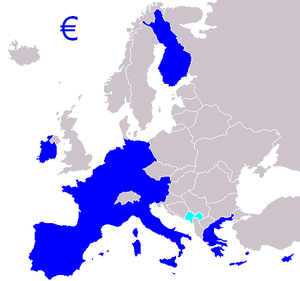
Euro Zone 2008 ; dark blue : de jure ; pale blue : de facto (Photo credit: Wikipedia)
It may not look like the Euro Crisis and the World Shipping Crisis have much in common, yet they do and here is how. The key element that links them is the lending behavior of the German banks!
From the beginning of the Euro crisis - it started in early 2010 when Greece officially asked Brussels for a bailout -, I've been wondering what caused Germany to drag its feet. If only Ms. Merkel had moved fast enough to meet Greek demands, Greece would have been saved within the year and the Euro Crisis would never have happened.
Why did Ms. Merkel not move? Very odd, if you consider how often she claims she's a European at heart and that "more Europe" is needed to solve the crisis.
Not so odd if you consider the lending history of German banks and how they've granted easy credit left and right, at home to political pals, to the Greeks to finance the Olympic Games and more, to Southern Europe in general, to Ireland...and, yes, to the shipping industry!
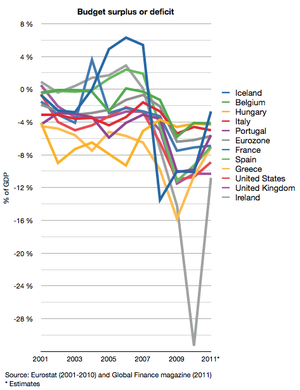
Starting in 2008 everybody in deficit! Graph shows government surplus/deficit of Portugal, Italy, Ireland, Greece, United Kingdom, Spain (PIIGGS) against the Eurozone 2000-2010 and the United States. Data from Eurostat. (Photo credit: Wikipedia)
Instead of pooling the debt which would have been the quick, rational and elegant way out of the Euro crisis, Merkel pushed through entirely different policies, i.e. bailouts coupled with austerity measures and fiscal pact agreements with Eurozone members, all of them politically and institutionally complex, hence time-consuming. Yet, when it comes to finalizing what she has set out to do and put the needed Eurozone institutions on a solid basis, suddenly it's no go.
The last tassel is Euro bank supervision, but Germany will have none of it. Or will have it with all sorts of limitations, all aimed at protecting German banks from oversight. Why is Germany so eager to shield its banks?
At first, it looked like the German Central Bank, the Bundesbank, was eager to protect the state-owned Landesbanks that have suffered losses with the 2008 crisis and are reeling from accusations of corruption. Indeed, there is strong evidence of an unhealthy relationship between local politicians and the regional-level banks. Landesbank rescues have placed a heavy burden on German state governments (more deficits!) and this has had repercussions on the whole German banking system. A consolidation of German landesbanks that was expected to happen is now unlikely, suggesting that the situation is stalled and that the move towards a healthier system that would stimulate productive competition between the public and private sector, is still far off in the future.
But in Germany, private sector banking is also suffering! Not only did the German banks expose themselves to the Greek and other Southern European debt, they also recklessly engaged in easy loans to the shipping industry. Loans resulted in a huge overflow of needless investment in the ship container market, currently causing some 300 big container ships to sit idle in ports around the world, waiting for customers!
The story of this shipping crisis only recently came out in the New York Times (see article below or the report here). According to Moody's, Germany’s 10 largest banks have 98 billion euros, or $128 billion, in outstanding credit or other risks related to the global shipping industry. That's about as much as the German banks' exposure to Greece when the debt crisis broke out (they are now down to €5.5 billion) !
All through the Euro crisis, the German Banks have been Germany's Achilles' heel. Though Germany is the locomotive of Europe, its banking system is in trouble. Small wonder Germany resists any proposal to set up bank supervision across the Eurozone! Or, for that matter, any proposal to pool or mutualize the Euro debt...If only Germans would listen to their own Peter Bofinger! I am completely convinced that Germany would be the greatest loser in a Euro breakup and that instead of bailouts we should have gone for Bofinger's proposed "redemption fund" - but that story is for another blog post.
Now that the Eurozone recession is projected to last well into 2013, setting up a credible system for supervising the 6,000 banks in the Eurozone has become a major building block in the institutional structures needed to solve the Euro crisis. Mario Draghi, the European Central Bank chief, is doing his best to allay German fears that the ECB might control them in some way, suggesting that the supervision of Landesbanks could be done at regional (and not European) level.

Mario Draghi at G-7 meeting at the Istanbul Congress Center (Photo credit: Wikipedia)
That looks like Draghi is addressing concerns over the last crisis - the landesbanks - and eschewing the present one - the world shipping crisis. No doubt, German politicians prefer to talk about the former rather than the latter, especially now that Ms. Merkel has launched her political campaign for re-election. The last thing she needs is to come out looking like the paladin of the 10 biggest German banks - but by helping to slowdown the establishment of a Euro bank supervisor, she is satisfying everyone's interests, including those of the German One Percent!
The One Percent however has wonderful ways to zig zag around traps and change the outcome of the game. While the big German banks are hurting from the shipping crisis, and ship funds have obviously lost their appeal, there is one (small) part of the world's One Percent that is having a ball game: because of the crisis, ships that cost hundreds of millions of dollars to build are now selling at the cost of scrap metal.
Guess who's busy buying up ships at bargain prices? Healthier shipping companies, of course, and among them (according to NYT) Costamare, a Greek company! I love that. Greek shipping magnates are real savvy types: their home country, in spite of the government debt fracas, is a tax haven for them, and continues to be in spite of all the talk about recovering taxes, which of course, leaves them with the funds to still act as major agents in the world shipping industry!
No question about it, the Greeks are clever! Small wonder the Germans are so angry and after them. I tell you, in spite of what politicians say to their electorate, austerity and fiscal pacts have little to do with preserving Northern European taxpayers from wasting their funds to bail out Southern European countries and Greece in particular. The real game is played elsewhere, behind the scene and at the One Percent level...
Please share your views. I know not everyone likes to argue in terms of the One Percent, but what do you think about this juicy bit of news, Greek shipowners buying up ships at rock bottom prices?
Related articles
 Euro Crisis Feeds Corruption as Greece Slides in Rankings - Bloomberg
Euro Crisis Feeds Corruption as Greece Slides in Rankings - Bloomberg The Next Crisis for German Banks - Shipping
The Next Crisis for German Banks - Shipping Euro Crisis Aside, a Banner Year for German Stocks
Euro Crisis Aside, a Banner Year for German Stocks Draghi seeks to allay German concerns on banking union
Draghi seeks to allay German concerns on banking union Lone German Keynesian Advocates Pooling Euro Debt - Bloomberg
Lone German Keynesian Advocates Pooling Euro Debt - Bloomberg

Published on December 07, 2012 01:03
December 4, 2012
A Walk in the Paris I Love
Last week I was in Paris and I'd like to share with you the Paris I love, a little bit hidden, not your usual monuments and touristic high points. Come with me to Shakespeare and Co., surely the most extraordinary bookstore in all of Paris and probably Europe.
Here it is, lying low and snug between two tall 19th century buildings along the river Seine (in the 5th arrondissement). Yet the bookstore is no doubt much older than its neighbors, just look at the beams climbing up between the two façades:

Moving closer, the bookstore is in the back, on the left and a neat little restaurant is up front:

Here it is at last, the splendid, cluttered façade of the Shakespeare bookstore:

Over the front door there's a reminder of George Whitman, a friend of Jack Kerouac and Allen Ginsberg, but above all, the mythical founder of the bookstore (he founded it in 1951 and died in 2011):

Yes, "...the business of books is the business of life." I love that! And there's no bookstore anywhere that feels more like a temple dedicated to readers than this one.
Inside, the charm of old rickety stairs and bare stone walls:

The reading room with a view on the Seine: here you're allowed to read whatever you like but you must put the book back on the shelf when you leave:

There's a place to play chess:

Another for music:

And so much fantasy:
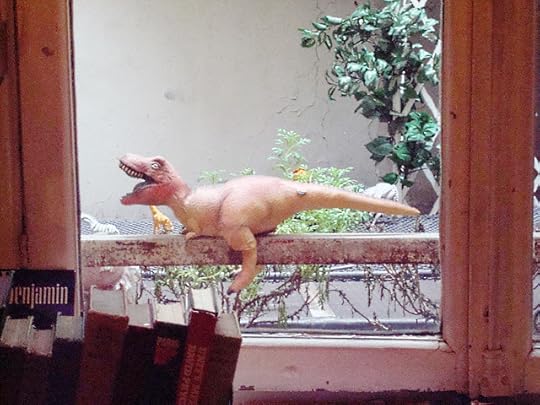
Yes, this is a bookstore I love!
Even their paper bags to carry your purchase are cute:

And of course, their trademark poster, a painted board on the façade:

This is a library with a personality, a brand, a mission in life: spread the love for books! And that's becoming an ever harder thing to do!
Because times for book stores are not really any happier in France than in the United States or anywhere else in the developed world: a famous Parisian bookstore, the "librairie del Duca" on the Boulevard des Italiens just closed its doors on 30 November. It had been created in 1952 by Cino del Duca, a mythical editor and publisher as well as film maker. His widow had set up a foundation to help artists (she died in 2004) but in spite of annual sales over €2 millions/year, the library didn't make it. Now it's finished, according to the Figaro (23 November) the plot it stands on will be taken over by the next door supermarket, a Monoprix that probably won't even sell books...
After we finished our tour in Shakespeare & Co. (I say we, my husband and I), spending the whole morning there, we went to the neat little restaurant next door that we had spotted walking in, Le Petit Chatelet. Cozy inside, with a working fireplace where they cook your meat:
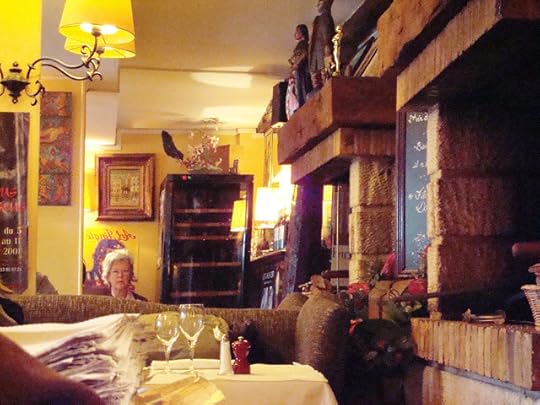
Yes that's me in the mirror (looking very serious, sorry, I hadn't realized my camera had taken me in!). And the menu of course is classically hand-written on a blackboard:

We opted for a fish soup and it was lovely! Afterwards a nice walk along the Seine, stopping at a book stall:

You can see Notre Dame peeking behind him! And the Seine carries sometimes surprising boats (not just the fast ones for visitors), like this huge coal carrying barge:

The coal looks like warm black velvet...and what a beautiful river.
Ah, Paris!
If you're in Paris, here are the addesses:
Bookstore Shakespeare & Co: 37 Rue de la Bûcherie 75005 Paris, tel: 01 43 25 40 93
They have a neat website where they announce in a serendipitous manner all their upcoming events: http://www.shakespeareandcompany.com/
Restaurant Le Petit Chatelet: 39 Rue de la Bûcherie 75005 Paris, France tel: 01 46 33 53 40. It's ranked #83 out of some 8500 restaurants in Paris by TripAdviser. The day we were there, there were only French clients, a good sign!
Please share in the comments your own experience of Shakespeare & Co or the restaurant Le Petit Chatelet if you went there, or tell us about your own favorite place in Paris!



Here it is, lying low and snug between two tall 19th century buildings along the river Seine (in the 5th arrondissement). Yet the bookstore is no doubt much older than its neighbors, just look at the beams climbing up between the two façades:

Moving closer, the bookstore is in the back, on the left and a neat little restaurant is up front:

Here it is at last, the splendid, cluttered façade of the Shakespeare bookstore:

Over the front door there's a reminder of George Whitman, a friend of Jack Kerouac and Allen Ginsberg, but above all, the mythical founder of the bookstore (he founded it in 1951 and died in 2011):

Yes, "...the business of books is the business of life." I love that! And there's no bookstore anywhere that feels more like a temple dedicated to readers than this one.
Inside, the charm of old rickety stairs and bare stone walls:

The reading room with a view on the Seine: here you're allowed to read whatever you like but you must put the book back on the shelf when you leave:

There's a place to play chess:

Another for music:

And so much fantasy:

Yes, this is a bookstore I love!
Even their paper bags to carry your purchase are cute:

And of course, their trademark poster, a painted board on the façade:

This is a library with a personality, a brand, a mission in life: spread the love for books! And that's becoming an ever harder thing to do!
Because times for book stores are not really any happier in France than in the United States or anywhere else in the developed world: a famous Parisian bookstore, the "librairie del Duca" on the Boulevard des Italiens just closed its doors on 30 November. It had been created in 1952 by Cino del Duca, a mythical editor and publisher as well as film maker. His widow had set up a foundation to help artists (she died in 2004) but in spite of annual sales over €2 millions/year, the library didn't make it. Now it's finished, according to the Figaro (23 November) the plot it stands on will be taken over by the next door supermarket, a Monoprix that probably won't even sell books...
After we finished our tour in Shakespeare & Co. (I say we, my husband and I), spending the whole morning there, we went to the neat little restaurant next door that we had spotted walking in, Le Petit Chatelet. Cozy inside, with a working fireplace where they cook your meat:

Yes that's me in the mirror (looking very serious, sorry, I hadn't realized my camera had taken me in!). And the menu of course is classically hand-written on a blackboard:

We opted for a fish soup and it was lovely! Afterwards a nice walk along the Seine, stopping at a book stall:

You can see Notre Dame peeking behind him! And the Seine carries sometimes surprising boats (not just the fast ones for visitors), like this huge coal carrying barge:

The coal looks like warm black velvet...and what a beautiful river.
Ah, Paris!
If you're in Paris, here are the addesses:
Bookstore Shakespeare & Co: 37 Rue de la Bûcherie 75005 Paris, tel: 01 43 25 40 93
They have a neat website where they announce in a serendipitous manner all their upcoming events: http://www.shakespeareandcompany.com/
Restaurant Le Petit Chatelet: 39 Rue de la Bûcherie 75005 Paris, France tel: 01 46 33 53 40. It's ranked #83 out of some 8500 restaurants in Paris by TripAdviser. The day we were there, there were only French clients, a good sign!
Please share in the comments your own experience of Shakespeare & Co or the restaurant Le Petit Chatelet if you went there, or tell us about your own favorite place in Paris!


Published on December 04, 2012 07:59
November 28, 2012
Google Drive Has Arrived, Big Brother Getting Bigger!

Diagram showing overview of cloud computing including Google, Salesforce, Amazon, Microsoft, Yahoo, Zoho, Longjump and WorkXpress (Photo credit: Wikipedia)
Google Drive suddenly popped up on my Google mail as I was busy writing. Always curious, I downloaded it and couldn't believe what I saw: suddenly, in about a minute or less, everything that I had ever stored on my computer was up there, inside of that neat-looking icon file called Google Drive. It sat on my computer's desktop and was reachable from my Gmail, making available everything I ever wrote, every picture I ever took, every video I ever made for any other of my devices as I travel around, my mobile phone included!
Google Docs has become Google Drive. Now I can attach directly to any mail any doc I have on my computer.
And if I wanted to, I could send up to 10 GB attachments to my Google Drive - that's 400 times larger than what Gmail previously allowed. No need for extra storage space in the Cloud, Google has thought of everything for me.
Wow!
I'll be honest with you. I never had that much to attach anyway, I'm not a corporation! But I do note two things of interest:
1. Google neatly did away with the need for any storage service for most people - unless you don't trust Google. I have friends who argue that if Google collapses, all their stuff will disappear, including blogs such as this one. Maybe. Quite frankly, if Google collapses, it's very, very likely that the whole of Internet will have collapsed, but that's just my humble opinion. No doubt storage services in the Cloud will continue to thrive on the basis of people's dislike for or lack of confidence in Google.
2. Google is Big Brother Watching Over You: please note I wrote "over you". This is not the famous Big Brother , the mysterious dictator of Oceania, a totalitarian state in Orwell's 1984 who is watching you. No, here Google is watching over you. Google is out to help you.

Bill Gates of course! Image via CrunchBase
Fine and good.
I just hope Google stays the same, with that altruistic corporate culture, a little bizarre given the American love story with jungle capitalism.
One can't help recall that America is the historical birthplace of robber barons, and Americans ever since their country was created, harbor an unshakeable admiration for self-made men. The American Dream. Yet, all too often, they are nothing but heartless business tycoons out to grab your last dollar.
Still, one has to admit that America is also the country that has given birth to a remarkably large number of philantropic billionnaires like Bill Gates and Warren Buffett, and the latter is constantly calling for more taxes on the rich, a remarkable selfless stand. We're still waiting for Europeans, Chinese, Indian, Mexican and Brazilian billionnaires to join the charity club. Hey, any Greek shipowner out there willing to save his country and forego the tax holiday granted by his governmnt?
Alas...
When all is said and done, America remains an amazing country, with both the best and the worst. Others need to catch up!
Your opinion? Did you get Google Drive and are you using it?
Related articles
 Attach 10GB Files To Gmail With New Google Drive Integration [Updates]
Attach 10GB Files To Gmail With New Google Drive Integration [Updates] How to Integrated Google Drive into Gmail for Sending Large Files Easily
How to Integrated Google Drive into Gmail for Sending Large Files Easily Google integrates Gmail, cloud storage service Drive
Google integrates Gmail, cloud storage service Drive

Published on November 28, 2012 22:17
November 18, 2012
The Future of Publishing: Should Publishers Be Afraid of Amazon??
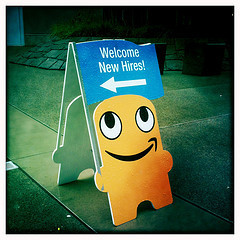
Amazon.com Welcome New Hires! (Photo credit: Will Merydith)
Has Amazon really grown into a dangerous book-selling colossus and is that why traditional publishers should merge to defend themselves? Some people argue that the Penguin and Random House merger is coming too late. Apple's "agency model", following price fixing investigations, has gone out the window, or at least it has "softened". As a result, they argue, it's game over, Amazon has won.
Too late? Game over? Yes, surely mergers could have started happening sooner but Time in legacy publishing is famously slow (it takes publishers on average 2 years to come out with a new book...) But I would argue that it's a physiologically sound move, one long awaited perhaps, but the right move all the same.
As soon as the Digital Revolution got going, there was talk that the Big Six would start merging and that you'd soon get the Big Five, then the Big Four etc ending perhaps with only the Big Three or Big Two. All facing Amazon, like small Davids facing Goliath, because Amazon is about three times bigger than Random House and Penguin combined (and they're slated to be the biggest publishing house in the industry).
This said, we should start by noting a very simple thing about Amazon: it's NOT just a publishing house. They've got a limited number of imprints (essentially 5) and some of them sound rather small with a relatively modest number of titles, at least so far... Amazon is deliberately vague about its Kindle sales figures, though it's likely that digital sales outpace printed. So the total sales figures for Amazon (over $48 billion in 2011), while impressive, don't concern just the book trade but everything else it sells, from electronic gadgets to clothes. For example, Amazon reports that in the last quarter of 2011 the number of Appstore for Android customers has nearly tripled from the previous quarter (with them downloading more apps in Q4 than all of the previous quarters combined), and that the number of Instant Video customers has more than doubled year-over-year (with the number of streams increasing 300 percent from the previous quarter).
Now what is the proportion of books in its overall sales, nobody knows. But what that does is downsize the difference between Random House/Penguin's combined sales projected at some $4 billion. Amazon is not likely to be 10 or 12 times larger since, as a publisher, it's much smaller than the total sales figure suggests...
Because Amazon, more than a publisher, is actually an e-trader: it's a platform to sell books, both digital and printed. But even here Amazon's future is not necessarily all that rosy. There's even talk that Amazon is running into a brick wall, quite literally, for example with that release on 20 November of best-selling author Tim Ferris's book The 4 Hour Chef (see article below). Everyone's talking about it: how Amazon gave Ferris a 6-digit advance and now the author can't even place his new book anywhere in brick and mortar stores not to mention Barnes and Noble that flatly refused to carry the book, or so goes the gossip...

Tim Ferris Image by Scott Beale / Laughing Squid via CrunchBase
But there's more to it. On the e-reader front, competition has increased, Kobo , a Canadian upstart recently acquired by a Japanese e-tailer, is now spreading everywhere in the world and Barnes and Noble's Nook, for long restricted to the American market, has grown by leaps and bounds. Following a recent $605 million cash injection by Microsoft, it is set to expand in the UK this autumn. At this point, it would seem that Amazon controls some 60% of the digital market, admittedly a huge portion, but a lot less than the 90% with which it had started some four years ago.
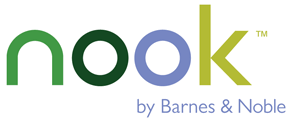
English: Logo for the Barnes & Noble Nook (Photo credit: Wikipedia)
Then there's another worrisome bit of news for e-reader producers: a recent survey showed that a third of e-readers were used only once by their new owners! And fully 25% of the people who were interviewed to explain their rejection of e-readers flatly stated that they preferred printed books. The Digital Revolution may be hitting a brick wall! In any case, it's not as pervasive as most of us think and it certainly calls into question Amazon's business model (which consists in selling e-reading devices at or below cost to gain market shares and then make up for the loss or lack of profit through content, i.e. book sales).
Also, of late, Amazon has run into problems with customers regarding book reviews. It has understandably tried to "clean up" the system that had become corrupted by cozy reviews from family and friends. But its algorithm to flush out the corrupted reviews ended angering a lot of people, especially writers (who tend to write reviews more easily and more of them than average readers). Many writers have found to their surprise that Amazon was taking down perfectly bona fidae reviews and hurting honest people, most famously Joe Konrath who posted about this on his blog.
So Amazon's not doing quite so well these days...
Indeed, by opening its doors to self-published authors without putting up any gate keeping or quality control systems, it has been flooded with poorly edited books, full of typos, ill-structured and badly written - not to mention semi-pirated books using content widely available on Internet that are brazenly passed for something new. As a result, in some quarters, Amazon is viewed as a slush pile publisher - not a reputation to be envied. I have no doubts that at some point Amazon will rectify the situation. In the meantime, to be published on Amazon is just not the same as being published by a traditional house.
To be sure, the stigma attached to self-publishing has been largely removed. It's certainly one of the major achievements of the Digital Revolution, marked by the amazing successes of authors like Amanda Hocking, John Locke, Joe Konrath and Bella Andre, but the fact remains that indies do not enjoy the same reputation as traditionally published authors.
There are really two possible game changers that could dramatically change the future of publishing: discoverability and distribution. Let's look at them in turn:
(1) Discoverability: It is a problem for publishers (it was recently discussed in a very interesting conference in New York) but for an indie, it is a nearly unsurmountable challenge. A self-published author simply does not have access to the publishing industry's major literary critics, papers and magazines, nor for that matter, to the industry's major competitions and prizes, like, for example, the National Book Awards, the Pulitzer or the Man Booker Prize. Amazon is well aware of this, so it's no surprise that it has set up regular imprints modeled on traditional publishing and hired experienced professionals to run them.

Screw Amazon.com (Photo credit: ucicsboy)
(2) Distribution: Here traditional publishers are laboring under a constraint that does not affect Amazon: they have traditionally set up a system with bookstores and other distributions points that allows the stores to return all unsold books, without however controlling how much stores order on the new title list. As a result they tend to order too much and the returns eat up the profits of the publishers (and royalties of authors).
This is not a viable model. Why is Amazon not affected? Simple, they have their Create Space division that prints books on demand (so-called POD technology) - no storage problem, no distribution problem.
The big question (and the surprise) is that publishers have not taken on Amazon on its own ground: why not move to POD publishing?
Why not set up POD machines in book stores, machines that would be dedicated to publishing their titles, with copies of the printed books nicely displayed around the machine and online terminals to "leaf through" their books in a virtual manner, the way one does on the Kindle store. And while your book is printed, you could sip a tea or coffee or munch on a pastry, since it takes a little time to be printed - too much perhaps, the POD machines are still clunky but surely they could be improved: never underestimate the advances of technology... In short, successful bookstores would be the ones with POD machines and the capacity to turn themselves into attractive coffee houses and community centers for events to meet authors etc.
Under the circumstances, if Big Publishers merge, and even medium ones merge too, thus acquiring more financial means and the capacity to move into new directions - like POD publishing - their future could look a lot better than we all have been led to believe up to now.
Of course, how innovative Big Publishers are likely to be is anyone's guess.
Still, I don't believe we should view Amazon as a Big Black Wolf or even as a Colossus in publishing. As I've blogged before, Amazon is certainly the Next Big Publisher. But it's more than that, or rather it's something slightly different: it's primarily a book trading e-platform and secondarily a POD publisher (with CreateSpace).
To conclude: there is space for Amazon AND the Big Six, sorry I mean the Big Five. Consider this: if instead of viewing Amazon as a rival (which it is and isn't at the same time), publishers could start using it for what it is (an e-platform) and why not, collaborate and even ally themselves with Amazon in particular areas, like, for example, assist in cleaning up the book review system? If a book quality gatekeeping sytem was set up, and if it were made reliable and efficient in helping readers search for the kind of material they like to read, I think everyone would gain, publishers and readers alike!
What is your opinion? Do you think that the move to merge forces is coming too late for the publishing industry? That Amazon will remain alone as the Big Winner of the Digital Revolution?
Related articles
 Booksellers Resisting Amazon's Disruption
Booksellers Resisting Amazon's Disruption Amazon removes book reviews by fellow authors
Amazon removes book reviews by fellow authors Media reacts to Penguin-RH merger
Media reacts to Penguin-RH merger Joe Konrath: Amazon Deleted My Reviews
Joe Konrath: Amazon Deleted My Reviews Bertelsmann's pickup of Penguin shows the poor state of British publishing | Ian Jack
Bertelsmann's pickup of Penguin shows the poor state of British publishing | Ian Jack Tim Ferriss: Even if I sell a million Kindle copies, some people will still call it a failure
Tim Ferriss: Even if I sell a million Kindle copies, some people will still call it a failure

Published on November 18, 2012 23:28
November 7, 2012
Human Trafficking: What YOU Can Do to Stop it!
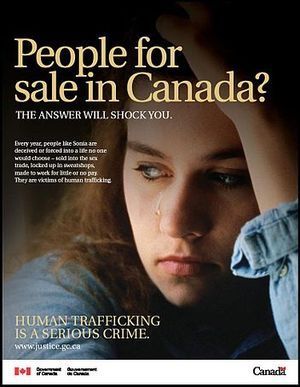
A human trafficking awareness poster from the Canadian Department of Justice. (Photo credit: Wikipedia)
Slavery in the form of human trafficking is one of the most profitable businesses in the world...and most despicable. For years, one of the major figures in American journalism, Nicholas D. Kristof, New York Times columnist led a personal battle against modern day slavery. He recently wrote an opinion piece (see here) trying to, as he puts it, "giving voice to the voiceless". Victims don't dare to speak up. And if you don't speak up loudly, politicians don't listen.
To be a human rights activist is an UPHILL battle!
In that piece, he reports on how President Obama's landmark speech against modern slavery on 25 September (before the Clinton Global Initiative, see article below) was met by shrugs from "many of us in the news media". Why? Because "it didn’t fit into the political narrative. It wasn’t controversial, so — yawn — it wasn’t really news." Kristof went on to explain how, despite the yawns, this issue is important: a major American legislation against human trafficking is at risk. While "Republicans have done superb work on the issue in the past", says Kristof, "now they're balking at straightforward re-authorization of the
Trafficking Victims Protection Act - landmark legislation against human
trafficking. What are they thinking?" he asks, sounding quite
disgusted!
Fortunately Obama was re-elected. And now, we can hope that this piece of legislation will be renewed asap, just as it should!
Still, it's depressing that in our day and age, more than 150 years after slavery has been abolished, we have to argue the point. That there are people out there that don't think slavery is an important issue or that Kristof is plain boring about it (yes, I found criticism of his stance on Internet!).
How can anyone be in favor of human trafficking? Kristof confesses that he became "passionate about human trafficking ever since [he]encountered a village
in Cambodia 15 years ago where young girls were locked up, terrified,
as their virginity was sold to the highest bidder." My view is that we can all support the fight against modern day slavery without ever having been to Cambodia or witnessed the terrible scenes Kristof reports.
The statistics prove that human trafficking is increasing exponentially, and according to at least one expert, Anthony Steen, Chairman of the Human Trafficking Foundation, it's ten times worse today than it was 200 years ago in the heyday of slavery. Estimates about the number of victims vary: from a minimum of 12 to a maximum of 100 million people but, given its illegal nature, the numbers are clearly unreliable. Also the very definition of slavery is complex as it touches on a series of crimes that range from sexual exploitation to forced organ transplants. Perhaps the worse aspect is the large percentage of women and children affected. One thing is certain: trafficking victims are on the increase. Just to give one small example that is nevertheless indicative of the overall trend: newly released British data show authorities identified 946 trafficking victims last year, an increase from 710 in 2010.
And it's a highly lucrative business: according to Europol, the European Union’s criminal intelligence agency, trafficked children can earn more than $200,000 a year each for criminal gangs who train them to be pickpockets, beg and rob, or who force them into prostitution. And of course torture and sexual abuse are used to control them. Indeed, human traficking is predicted to outpace drug trafficking...
Now I have to confess a secret to you: I wasn't really aware of the extent of this on-going tragedy until I met Magda Olchawska, a hugely talented Polish film maker and author who's now working on an exciting film, ANNA AND MODERN DAY SLAVERY, a suspenseful and scary investigation of human trafficking, carried out by Anna, a lovely and generous young woman who's also a brilliant hacker. Anna leaves a highly paid government job to set up an underground Organization that exposes the horrors of sex slavery.
Here's the movie trailer:
Beautiful, haunting music, isn't it?
Well, perhaps you can't be like the brave Anna of the film, leave your job and fight a gang of human traffickers, but as citizens we should all try to be aware of the problem, make our politicians react and ensure that proper legislation is in place AND implemented! And as writers and film makers of course, any work aiming at exposing this scandal is more than welcome!
Curious about Magda Olchawska and how she came about to make this film (due to be released in 2013)? Here's an interview I made and that I have the pleasure to share with you:
Question: Tell us, Magda, what got you interested in the issue of human trafficking?
An amazing gal I e-met on Twitter: Lynn Robertson. I read one of Lynn’s poems and decided to do something about this horrifying situation. That's how the idea for Anna came about.
Did you write the film script or is it based on someone else's novel, novella or short story?
I wrote the script, which is based on imaginary situation and characters. Rather than focusing on the victims, the film is centered on the process of trafficking and how many people in high places are involved in this “business”.
Major difficulties in filming ? From what you told me, editing has turned out to be a problem!
Yes, the editor pulled out after realizing how much work that is. I’m going to edit the movie myself. I’m an editor at the end of the day...
How long does such a task take - what do you have 3 hours of film that you have to cut down to one hour and quarter or so?
Much more! We have over 12 hours of footage and the editing can take up to six months or even longer. It really depends.
It must be damn difficult to do. How do you proceed?
I have a clear idea of what I want and which scenes I’m going to use so hopefully this process isn’t going to be never ending! Filmmaking is difficult especially if you do it on a tight budget. But I love filmmaking so I really don’t mind looking after my baby J
Was the film entirely shot in Poland with Polish actors?
Yes, the film was entirely shot in Poland but we had an international cast and crew. The actors came from Poland, UK, Spain and Italy.
That's quite an international team! How did it work out in practice? In what language did you work?
It was a fantastic experience, everyone pitched in! We worked in multiple languages but the film was shot in English and just a little bit of Polish.
How long did it take you to shoot the film? A month?
Much less! 9 days. Our budget didn't allow us to shoot for longer than that.
Difficulties to obtain permission for street scenes and the like?
We didn’t get any permissions to shoot. We were trying to choose the locations wisely so we wouldn’t have to go through the hassle of getting permissions. They're both time consuming and expensive, we didn’t have money in our budget for that.
So you had financial difficulties. Wasn't the Indiegogo funding that you got enough?
The IndieGoGo funding was enough for the shooting. But not enough for the post-production. One of the producers has kindly agreed to pay for the editing equipment, which saved me loads of time from running another Indiegogo campaign.
However we will still need money for the sound editing and a little bit for the promotion and marketing.
If anyone of your readers would be interested in contribution & getting fantastic perks just follow the link http://annaandmoderndayslavery.weebly.com/support-the-film.html
I certainly hope people respond! But let me ask you, how did you pick the main actress? She has a beautiful, sensitive face, does she have previous experience in film making or is this a first big role for her?
I met Paula Preston over a year ago in London and while writing the script I was thinking of her. So when she accepted the role I was thrilled.
This was the first time Paula has been a lead in the feature film. So it was also a big adventure for her.
What did Paula do before she worked for you?
Paula's professional career includes film, TV and theater roles as an actress, dancer and presenter. Recent work includes Frankenstein's Wedding (BBC4), Resonance (directed by Colin Teague), YMMBT (West End Theatre), Whose Play Is it Anyway (Edinburgh Festival), School Play (Criterion Theatre), Lady MacBeth (Arts Ed) and Curriculum Bites (Presenter BBC).
That's quite a career! And this is not your first film either, I know, and you've won awards.
No, I’ve made many shorts before. One of them, “The Man with the Spying Glass” has won the award of best short film at the 2011 Ballston Spa Film Festival. However, “Anna and Modern Day Slavery” is my first feature film.
Once the editing of the film is done, where are you showing it?
We will probably try to hit a few A List Film Festivals and see if we get accepted. We will also organize community screenings and of course the movie will be available free of charge on the Internet.
Free of charge? That's very generous of you and a boost to the cause! Any more movies or ideas you've got up your sleeve and that you plan on doing next year?
LOL, I always love your questions. Of course I'm always working on something else. I've already started working on the second Anna script and I'm really hoping I'll be able to shoot "Two People" next year http://magdaolchawska.com/entry/12
So keep your fingers crossed that I'll be able to pull the funding together...
Thanks, Magda, and I am keeping my fingers crossed and can't wait to see your film! And the second Anna film too...
Here's the official press release of Anna and Modern Day Slavery, produced by Mayan Films in association with Altaire Production and Publication: http://annaandmoderndayslavery.weebly.com/press-releases.html
Here you can download the official media kit and get all the information about the actors etc: http://annaandmoderndayslavery.weebly.com/uploads/1/1/7/2/11727692/media_press_kit_download.pdf
Related articles
 How do you contribute to modern day slavery of human trafficking?
How do you contribute to modern day slavery of human trafficking? Will the government support my move against modern-day slavery? | Michael Connarty
Will the government support my move against modern-day slavery? | Michael Connarty Does Modern Slavery Start at Home?
Does Modern Slavery Start at Home? Europe Urged to Fight Modern Slavery at Home
Europe Urged to Fight Modern Slavery at Home Obama Outlines Efforts To Prevent 'Modern Slavery'
Obama Outlines Efforts To Prevent 'Modern Slavery' California boosts penalties for human trafficking
California boosts penalties for human trafficking

Published on November 07, 2012 11:22
November 2, 2012
If Obama Wins, Will America Go the Way of Spain and Italy?

English: Southern Europe, feeling red with anger (Photo credit: Wikipedia)
With Obama as President, America will go the way of Spain and Italy. That's what Romney just said, earning the ire and justified contempt of both Italian and Spanish citizens. The media here in Italy is full of angry headlines, including the Sole 24 Ore, a highly respectable rightist business paper (something like the Italian Financial Times). Is Romney really so desperate for votes that he needs to insult two ancient European countries that have always been loyal allies of America?

Romney (Photo credit: Talk Radio News Service)
During the last debate with Obama, I had noticed that Romney mentioned how the Obama government spending would lead America straight into a situation like Greece's. At the time, that was picked up by few people: presumably, the American electorate of Greek descent is not very large and the remark passed (nearly) unnoticed. But this time, he really put his foot in it, this is BIG! Americans of Italian descent and Hispano-Americans are millions! Do they enjoy the way Romney disparages the old home country? If Romney ever wins and becomes the next American President, he can be certain that he will not be received with roses in Southern Europe. Right now, they all see RED!
Particularly if you consider - as most Europeans do - that both the 2008 Big Recession and the unprecedented swell in the American debt have been the work of a succession of Republican administrations, starting with Reagan's deregulation and ending with Bush's two wars, in Iraq and Afghanistan. So if Southern Europe is in the mess it is in today, it is largely as a result of a complex series of events that can be traced to both the collapse of Wall Street in 2008 and the American wars in the Middle East. Sure, local corruption and the dead weight of bureaucracy and red tape have added to the pain, but it all began as a result of investors looking to line their pockets through attacking the Sovereign Debt of relatively weak states (after Dubai in 2009 they moved to Greece, remember?)
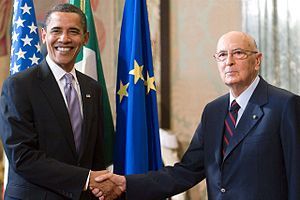
US President Barack Obama and Italian President Giorgio Napolitano in Rome (Photo credit: Wikipedia)
If Europeans could vote, the gap between Obama and Romney wouldn't be razor thin the way it is in America. Romney scares Europeans, indeed most of the world, with his astounding lack of diplomacy - but then Americans have never cared about their world image, have they?
Over here, on this side of the pond, we are all keeping our fingers crossed...for Obama! And if Republicans really can't stomach Obama, hopefully they will abstain and not vote for a man who is certain to create havoc in the international community, turning it from a "community" to a theater of war in his determination to make of America a new "uber alles" nation...
Related articles
 Mitt Romney botches another Italian job as anger lingers over Bain coup | John Hooper
Mitt Romney botches another Italian job as anger lingers over Bain coup | John Hooper How would the world vote in the US election?
How would the world vote in the US election? Spain Quip Adds To Romney's Foreign Policy Troubles
Spain Quip Adds To Romney's Foreign Policy Troubles Romney Offends Italians
Romney Offends Italians

Published on November 02, 2012 09:06



